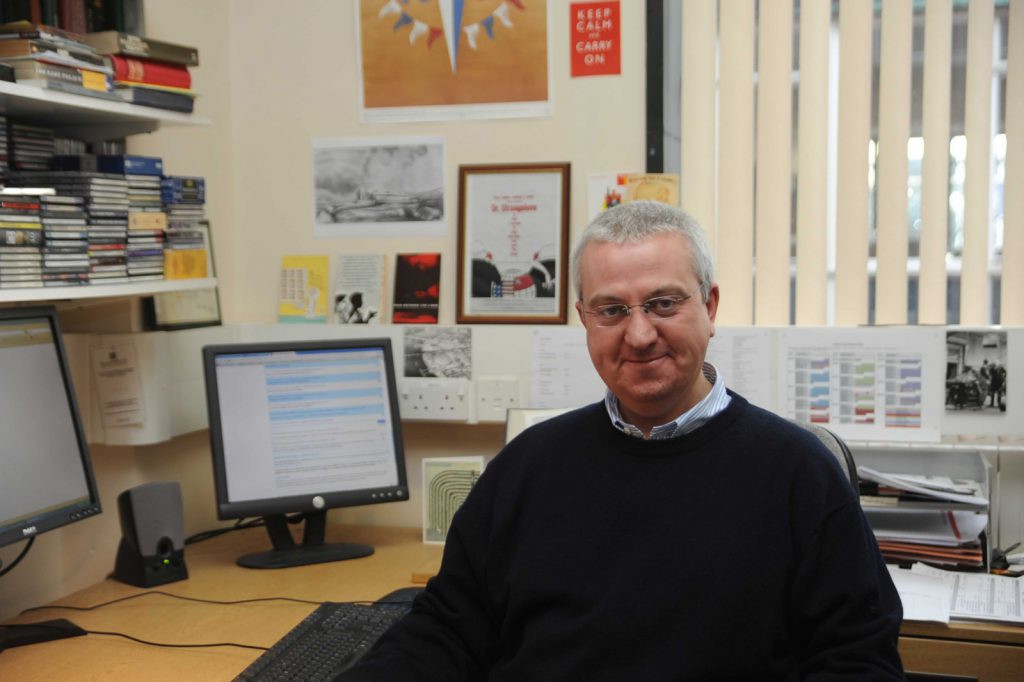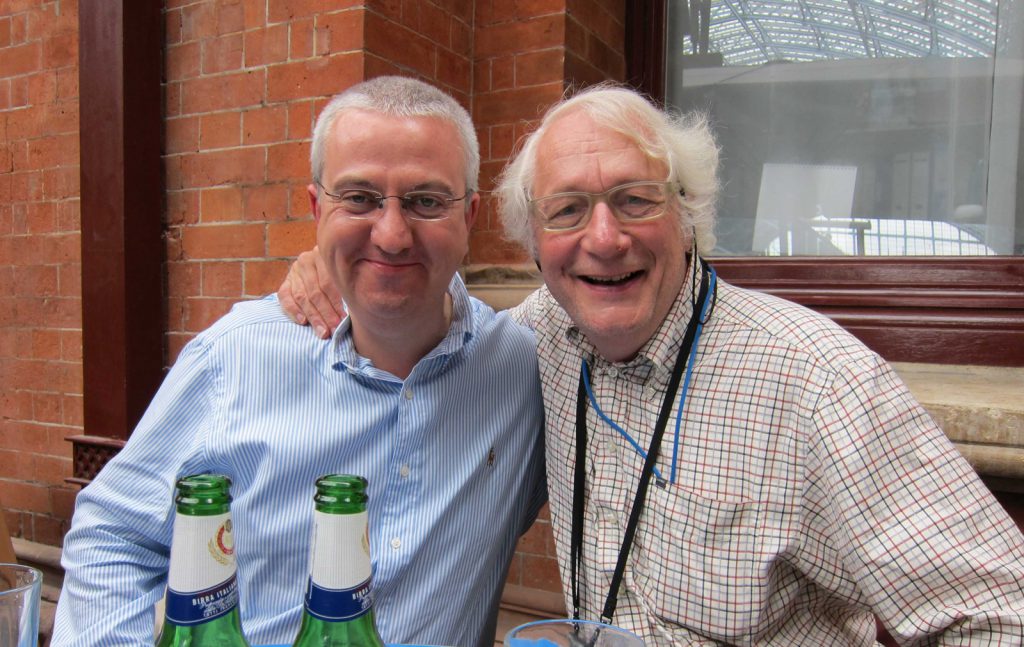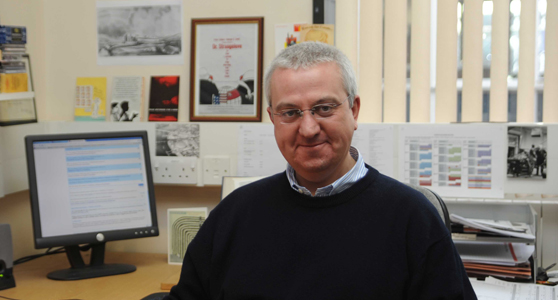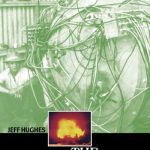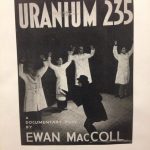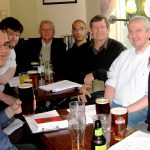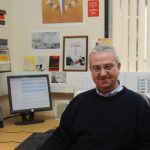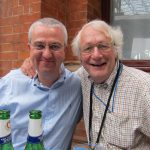In memoriam: Jeff Hughes, 1965–2018
Article DOI: https://dx.doi.org/10.15180/191109
Keywords
CHSTM, Jeff Hughes, obituary
Obituary
https://dx.doi.org/10.15180/191109/001With the death of Jeff Hughes, at the age of just 52, the international history of science and technology community has lost a much-loved friend and colleague and one of its finest research pathfinders and mentors.
Jeffrey Alan Hughes was born in 1965 in Glanamman, Carmarthenshire, the son of a miner. He attended Maesydderwen Comprehensive School in nearby Ystradgynlais from 1977 to 1984, and proceeded to Jesus College, Oxford as an undergraduate. Initially trained in chemistry, he transferred his attentions to the history of science and moved to Corpus Christi College, Cambridge as a postgraduate student in 1988, becoming a Fellow in 1991. His studies were based at the Department of History and Philosophy of Science, where he received his PhD in 1993.
Jeff’s thesis focused on what he called the ‘radioactivists’, the early radioactivity researchers whose ideas and experimental practices shaped the emergence of atomic physics as a discipline. He looked particularly at the community which formed around Ernest Rutherford, in Manchester and then Cambridge, and its relations with researchers in Vienna and elsewhere. Reflecting the analytical priorities of his own new-found research community, Jeff gave prominence to controversy around the replicability of the Rutherford group’s experiments, the suppression of uncertainties over the validity of scintillation experiments during the search for alternative methods, and the practical role of selective narratives in securing community consensus.
This first major project defined an approach that was to be echoed in many of Jeff’s later publications. His biographical interest in the mass spectrograph pioneer Francis Aston, for instance, inspired an examination of the role of Nobel Prizes in setting the scientific agenda, showing how the award of prizes to Aston and Frederick Soddy stabilised and promoted the validity of the isotope concept. Another article challenged nostalgic visions of a pre-1940s university physics based on benchtop-scale experiments and thrifty ‘sealing wax and string’ resourcefulness: in fact, Jeff concluded, progress relied significantly on industrial mass production for electrical valves and other essential parts, and connections with commercial suppliers such as Metropolitan-Vickers, seeded during Rutherford’s time in Manchester, remained crucial following his move to Cambridge.
Jeff’s own principal relocation, however, was the reverse of Rutherford’s. In 1993 he left Cambridge for a lectureship at the University of Manchester’s Centre for the History of Science, Technology and Medicine (CHSTM), established in 1986 under the direction of Professor John Pickstone. As the first long-term member of staff working primarily outside the history of medicine and the biosciences, Jeff was instrumental in shaping CHSTM’s now-familiar profile as a genuinely integrated cross-disciplinary group with a strong critical mass in twentieth-century studies. This he achieved through international networking around his own research; through undergraduate teaching, focusing particularly on nuclear culture; and, above all, as a PhD supervisor and mentor. He was, at times, lead supervisor to as many as half the doctoral students in the Centre: several of these developed projects close to his own interests, but others pursued a much wider variety of topics, from crystallographic computation to airships to electricity consumption in the home.
Another priority that shaped Jeff’s career was accessible communication. His best-known work, The Manhattan Project: Big Science and the Atom Bomb, appeared in 2002 as part of Icon Books’ Revolutions in Science series, established as a forum for academic historians to produce affordable and readable accounts of ‘scientific history as it really happened’ for general audiences. Typically, Jeff’s narrative blended a history of the atomic bomb project itself with a broader analysis of the ‘big science’ phenomenon, using the insights of his Rutherford-era research to argue that the Manhattan Project did not mark a fundamental watershed, but accelerated existing trends. The book was well received by its intended audience, but, thanks partly to its American release by Columbia University Press, has also found a niche as an undergraduate set text, accessible to science-focused students. Several researchers now working in the history of science or science studies have mentioned it as their first or favourite introduction to the field.
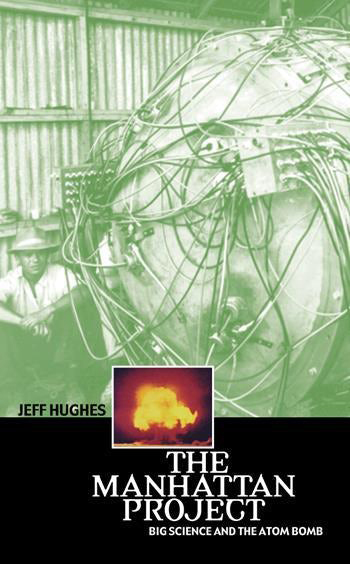
The majority of Jeff’s original research, however, concerned British science, albeit often in the context of its international networks. His engagement with the ‘radioactivists’ continued throughout his career but was joined by a growing interest in the role of the Royal Society as a de facto national science academy and its relationship to government, chiefly in the years after 1945. Both themes addressed the interrelation of science, the State and warfare (whether hot or cold), but the latter allowed Jeff to pursue his fascination with the mechanics of officialdom and the power and perceptions of the British establishment. He was particularly delighted to discover a classic ‘smoking gun’ document in the archives, showing that traditionalist Fellows of the Royal Society opposed plans for a grand showpiece Science Centre to be constructed on London’s South Bank because of the distance this would take them from their favoured haunt and strategic base, the Athenaeum Club.
The same fascination appears to memorable effect in Jeff’s account of the 1955 Strath Report, in which the bureaucracy of civil contingencies planning collided uncomfortably with the prospect of a thermonuclear Armageddon. Other publications dealt with remarkable and unexpected stories uncovered in the course of Jeff’s research: the production history of Ewan MacColl’s extraordinary, absurdist 1946 agitprop stage drama Uranium 235; the recollections of William Kay, Rutherford’s chief lab technician in Manchester; Francis Aston’s familiarity with the ‘occult chemistry’ promoted by the theosophist Annie Besant; and the influence of J G Crowther and other politically engaged science journalists in shaping national policy. The last of these provided impetus for Jeff’s long-term involvement in the emerging field of science communication studies, which in time became a major component of CHSTM’s postgraduate teaching profile.
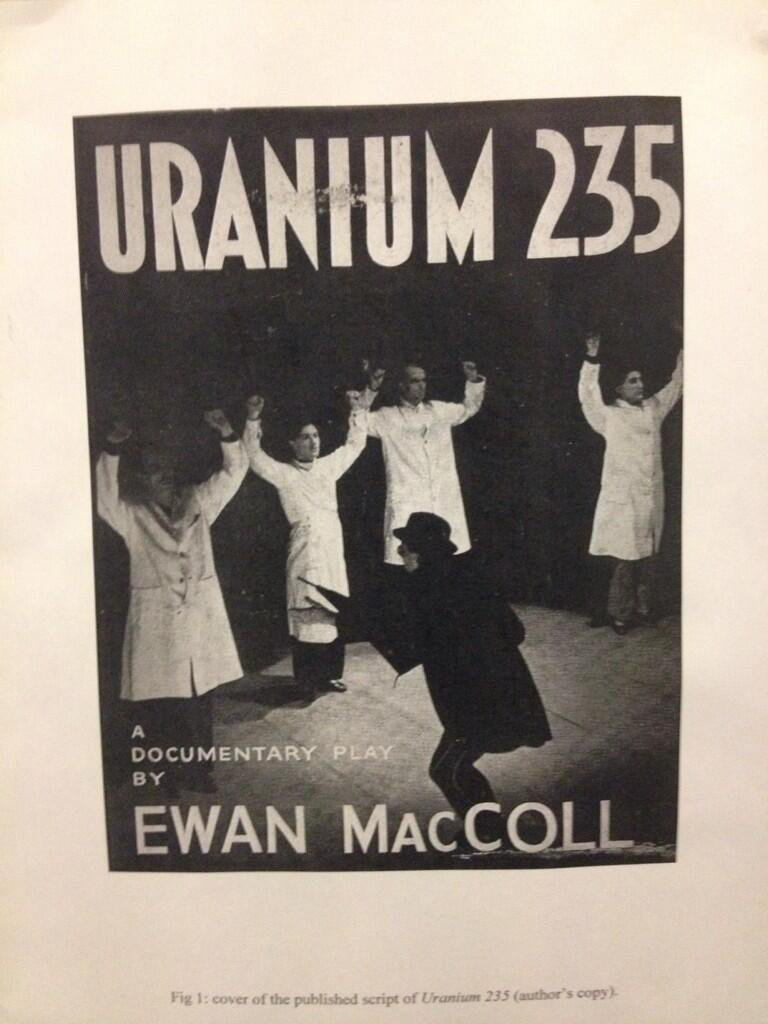
Jeff was a good friend to the Science Museum Group (SMG) over many years. He frequently arranged invitations for the museums’ research-active staff to speak at CHSTM’s seminar series, always laying on the warmest of hospitality and leaving speakers with a glow of friendship and a sense of being taken seriously. He also supervised a series of collaborative PhD projects alongside colleagues from both the Science Museum and the Science and Industry Museum, several of whom learned the ropes of supervision and advice from working with Jeff, besides providing informal advice to a number of other SMG students. His main supervisions, under the current and earlier collaborative programmes of the AHRC and ESRC, were as follows:
- Imogen Clarke, 2012, ‘Negotiating progress: promoting “modern” physics in Britain, 1900–1940’
- Emily Hankin, 2013, ‘Buying modernity?: the consumer experience of domestic electricity in the era of the grid’
- Jakob Whitfield, 2013, ‘Metropolitan Vickers, the gas turbine, and the State: a socio-technical history, 1935–1960’
- Rachel Boon, ongoing, ‘The Post Office Research Station at Dollis Hill, 1933–1956’
A further connection came following the appointment of the current SMG director, Ian Blatchford, when the Group’s Board of Trustees gained a Collections and Research Committee (CoRe), devoted to the governance and promotion of research and role of the collections within the museums. Jeff served on CoRe representing the history of science and technology, from January 2013, attending his last meeting in October 2017. In that role, as in so much of what he did, Jeff’s insightful and congenial presence was a blessing. Ludmilla Jordanova, the trustee who initially chaired the committee, comments: “Jeff was such a lovely warm presence. He was always willing to help on CoRe, and I think he saw himself as a bridge between [the Science and Industry] Museum and his part of the University, since relations had not always been easy. I think, too, that he was a very good critical friend, who read the papers, and asked searching questions. I found him personally extremely supportive to me, and it was lovely to be around him.”
Likeable and approachable by nature, Jeff made many friends throughout the international community. He saw academia as an inalienably social activity: having been a mainstay of the departmental social life that clustered around the Eagle pub in Cambridge, he imported something of the same culture to Manchester, most notably through a monthly reading group, hosted in the convivial setting of the Ducie Arms, attended by staff, graduate students and international visitors. At conferences, he would sit up until all hours, reminiscing with old colleagues or planning the future with new ones: one such session is attested to have concluded with a trip to a Rusholme curry-house as the sun rose at around four in the morning.
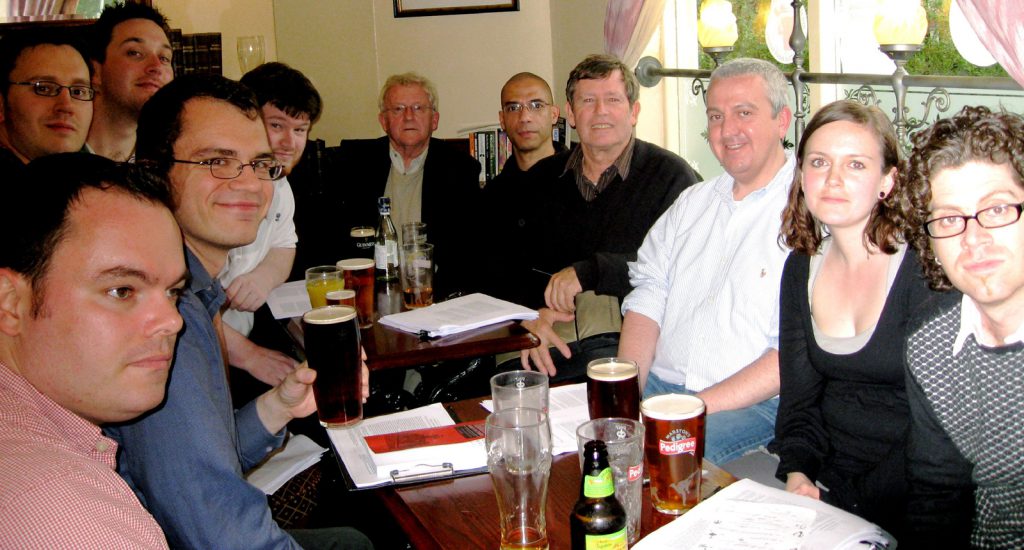
Jeff’s reputation as the life and soul of the party tended to conceal his equally valuable capacity as a skilled and efficient organiser (perhaps fittingly, given the close attention to the doings of ‘invisible administrators’ in his Royal Society research). His career-long involvement with the British Society for the History of Science included terms as Secretary and, from 2008 to 2010, as one of the youngest Presidents of recent times, campaigning on issues such as the preservation of contemporary scientific archives. His greatest administrative achievement was undoubtedly the 24th International Congress of History of Science, Technology and Medicine in 2013, which brought over 1,700 delegates to Manchester from around the world for a week of academic and social events, tours and excursions, and remains the largest event in the history of the field. The connections this established led to a new role as Treasurer to the historical division of the International Union of History and Philosophy of Science and Technology, in which he served for a short time before illness forced him to cut down the scale of his commitments.
For all that Jeff was a highly social academic, academic culture did not dominate his life: he was part of a close-knit family and a devoted member of live folk music communities in Manchester and beyond (a passion that was supplemented in his later years by an equal enthusiasm for jazz). Following his cancer diagnosis, and consequent early retirement, Jeff focused increasingly on spending time in the company of those closest to him, with frequent visits to the Northumberland coast, another passion. Yet he remained active in the research community to the last, finalising in September 2018 a chapter on the connections between Cambridge physics and the interwar radio ham enthusiast community which called back to his earliest work and developed its themes with reference to current scholarship.
Jeff is survived by his wife Natalie, Herbie the cavapoo, a large extended family, and three generations of appreciative colleagues, students and friends.
